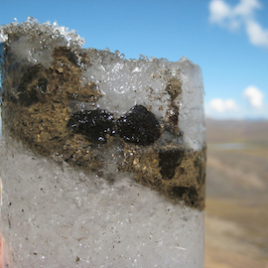The genome of a virus found in 700-year-old frozen caribous feces was shown to infect plants in the laboratory, a new study reveals. Researchers analyzed the viral genetic material contained in a core drilled through layers of accumulated caribou feces up to 4,000 years old in an ice patch in Canada’s Selwyn Mountain in the […]
Apprendre à tout âge grâce à l’essai-erreur
Une nouvelle étude montre que la méthode d’apprentissage par essais et erreurs est bénéfique pour la mémoire autant chez les jeunes et les plus âgés, mais uniquement si les erreurs ont un lien significatif avec la réponse. Des chercheurs ont demandé à 65 jeunes adultes âgés (22 ans en moyenne) et à 65 personnes âgées […]
‘Meaningful’ mistakes help learning at any age
A new study suggests that trial-and-error learning benefits memory in both young and old people, but only when errors are meaningfully related to the right answer. The study tracked 65 younger (average age 22) and 65 older (average age 72) people who tried to memorize lists of words. Making wrong guesses when given a clue […]
Un programme de filtrage pour trouver de nouveaux médicaments
Des chercheurs ont élaboré une nouvelle méthode informatique pour filtrer les molécules selon leur capacité à s’attacher à des enzymes et à des protéines afin d’aider à découvrir de nouveaux médicaments. De tels programmes informatiques existent déjà, mais ils modélisent la forme des molécules et seulement certains types de liaisons chimiques faibles. Ce nouveau modèle […]
Screening software could help find new drugs
A new method of screening molecules for their ability to bind to enzymes and other proteins could help discover potential new drugs. A newly built model looks at covalent bonding, a much stronger type of chemical attraction but one that is harder to model. Computer models that predict which molecules will interact with enzymes have existed […]
Arctic sea-ice decline has made severe Eurasian winters twice as likely
The decline in Arctic sea ice over the past few decades has doubled the chance of severe winters in Europe and Asia, a new study shows. Researchers performed computer simulations to show that sea-ice decline in the Arctic Barents and Kara seas since 2004 is linked to blocking situations of the jetstream which in turn […]
La réduction de la glace en Arctique rendra les hivers plus rigoureux en Europe et en Asie
Une nouvelle étude révèle que la réduction de la glace dans l’océan Arctique au cours des dernières décennies double les risques d’hiver rigoureux en Euope et en Asie. Des chercheurs ont utilisé des simulations informatiques et ont trouvé que la réduction de la glace dans la mer de Barens et la mer de Kara au […]
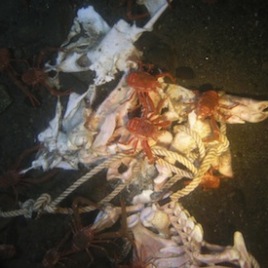
Unité d’enquête sous-marine : l’oxygène joue un rôle clé
Une nouvelle étude montre comment la concentration d’oxygène dissous dans l’eau joue un rôle primordial dans la vitesse de décomposition des corps sous l’eau. Cette étude pourrait servir aux enquêteurs qui doivent déterminer combien de temps un corps est resté sous l’eau. Des chercheurs ont mené cette étude en déposant trois carcasses de porcs à […]

Dissolved oxygen is key for underwater forensics
A new study indicates that dissolved oxygen has a big impact on how bodies decay underwater, a finding that could help in forensic investigations. Researchers deployed three pig carcasses outside the Victoria Experimental Network Under the Sea (VENUS), a cabled underwater laboratory with underwater cameras and sensors to record oxygen levels, temperature, pressure, salinity, density […]
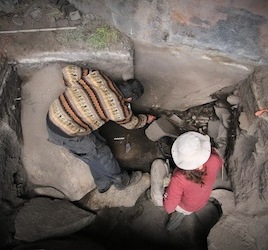
Early mountain-dwellers offer insight on adaptation
Evidence of the highest and oldest human settlements in the Peruvian andes offers insight on how quickly humans can adapt to extreme environments. Researchers found tools, animal bones and plant remains that suggest a human habitation in three locations: the Pucuncho workshop site (4355 metres above sea level), the Cunchaicha workshop (4445 metres above sea […]
How to reduce damage from unregulated fisheries
Canadians are used to the idea that governments regulate fisheries, but around the world more than 100 million people – 90 per cent of the worlds’ fishers – operate in small-scale fisheries with no records or controls. In a Policy Forum article, the authors recommend methods to reduce the damage that illegal, unregulated and unreported […]
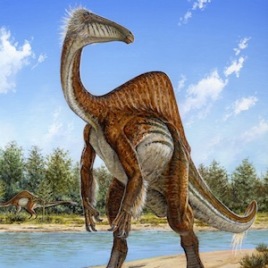
Largest ‘ostrich-like’ dinosaur may have been an omnivore
New fossils of a rare dinosaur found in Mongolia shed light on its dietary habits, and may indicate an omnivorous diet. Deinocheirus mirificus was previously known only from two large forelimbs found in the 1960s, and was thought to be the largest of the ornithomimids, a group of dinosaurs that superficially resemble modern ostriches. The […]
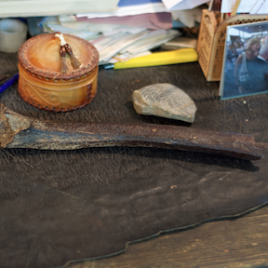
Genome of a 45,000-year-old modern human
Researchers have found that the genome of a 45,000-year-old human from Siberia is quite similar to the genome of modern Native Americans and East Asians and carries similar amount of Neanderthal ancestry. The remains of the Siberian male are believed by the authors to represent the oldest directly radiocarbon-dated modern human outside Africa and the […]
Pushing the limits of chemistry with iridium
A chemical containing the element iridium has set a new record for the highest recorded formal oxidation state in the periodic table of the elements. Formal oxidation state describes the number of electrons an atom loses or gains when it joins with other atoms in chemical compounds; the higher the oxidation state, the greater the […]
Controlling Ebola outbreak in West Africa most effective way to decrease international
Controlling the Ebola virus outbreak at the source in West Africa is the most effective way to decrease international risk of transmission, a new study of global airline travel patterns shows. The authors used a model that predicts that three people infected with Ebola are predicted to fly from West Africa (Guinea, Liberia, and Sierra […]
Got milk? No? Check your vitamin D
Children who drink rice, almond, soy or goat’s milk have lower levels of vitamin D in their blood than those who drink cow’s milk, according to a new study. Canadian regulations stipulate that every 100 millilitres of cow’s milk must be fortified with 40 International Units of vitamin D, non-cow’s milk is not subject to […]
